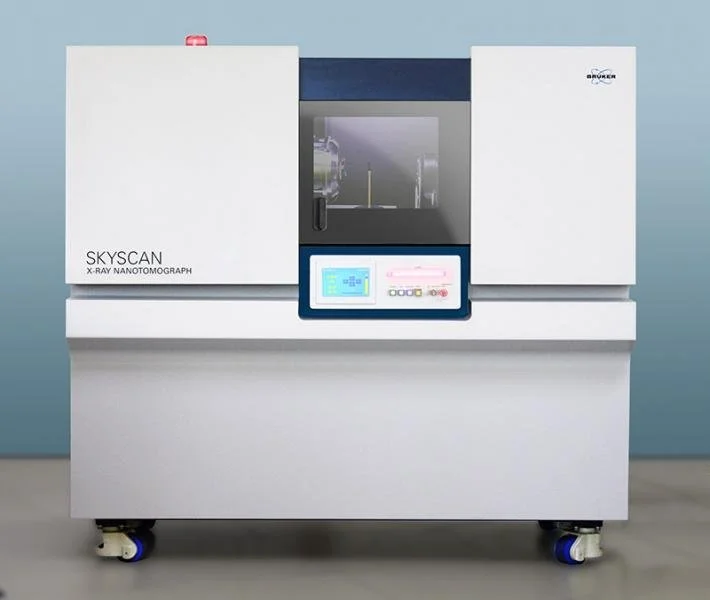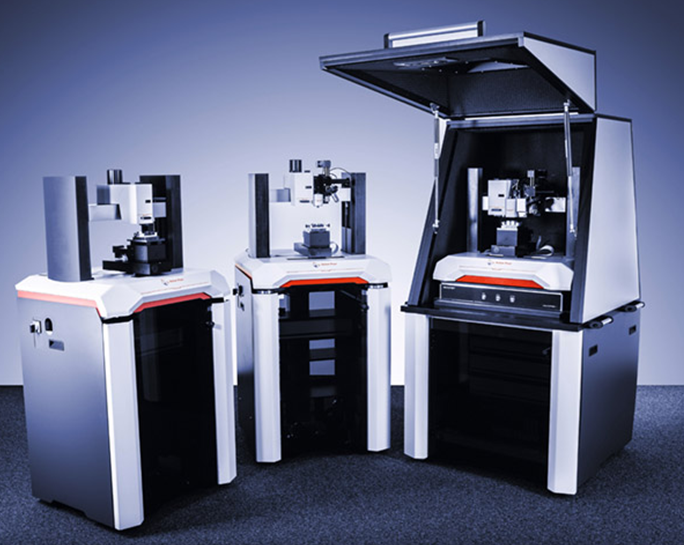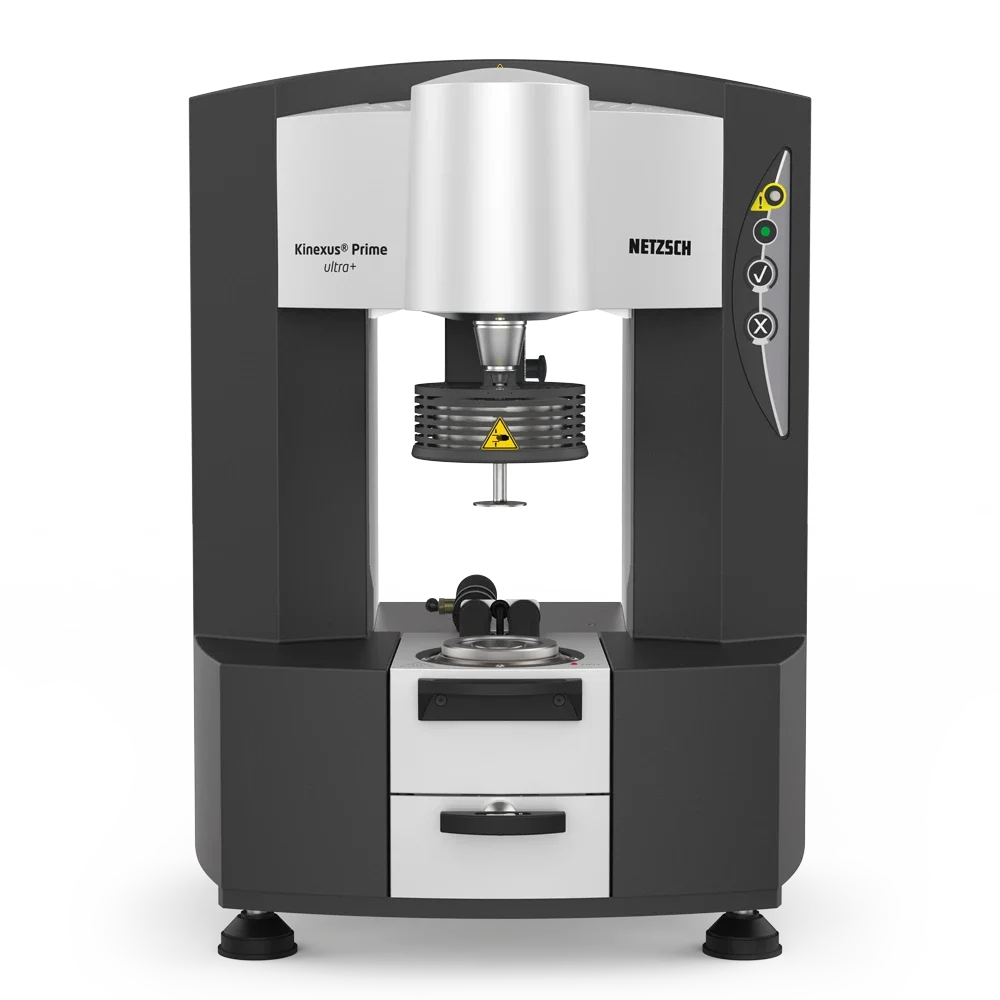FACILITIES AVAILABLE
Confocal laser scanning microscope
Stellaris 5WLL Confocal scanning system
WHITE LIGHT LASER- optimally matched detectors from our Power HyD family of detectors, gives complete spectral freedom to choose and combine exactly the right probes to answer your experimental questions.
X-ray DIFFRACTOMETER
Unique D8 diffractometer family platform
Application:
Traditional X-ray powder diffraction (XRD)
Pair Distribution Function (PDF)analysis
Small and Wide Angle X-ray Scattering (SAXS, WAXS)
Multiscale NANO CT- 2214
Nano-computed tomography is a high resolution CT-technology for 3D imaging at sub-micrometer resolution. Nano-CT images displayed greater detail of the ultrastructure for its use in dental samples.
JSM –IT800 NANO SEM
JSM –IT800 with super hybrid lens is the next generation electron microscope with the following attachments.
1) EDS - For elemental analysis.
2) EBSD – For crystallography analysis
3) STEM detector - For TEM mode analysis.
4) CL Detector - For Luminescence analysis.
5) Peltier cooling stage - -50 to +50 degree Celsius.
6) Critical point Dryer.
7) Coater.
Nano- scratch, Nano-indendation, ATOMIC FORCE MICROSCOPE
Step 700 surface testing platform with AFM, Image any type of surface, including polymers, ceramics, composites, glass, and biological samples. Measures
· Localized forces,
· Adhesion strength,
· Magnetic forces,
· Mechanical properties.
Chewing Simulator CS-4.4
Simulates various chewing movements in the mouth for material testing in a naturally simulated environment. Testing of Abrasion and fatigue, Bite splints, Implants , Crowns and bridges, Jaw models, Composite material, Temporary prosthesis, Abutments, Retention forces.
Thermocylcer TC 4 – Integrated thermocycler to function along with Chewing Simulator CS 4.4. Thermocycler can be used independently without chewing simulation also for aging of specimens.The temperature range is 4°C to 25°C for the cold cycle and 35°C to 60°C for the hot cycle.
Gas Chromatography–Mass Spectrometry (GC-MS)
Gas Chromatography–Mass Spectrometry (GC-MS) is a powerful analytical technique used for the identification and quantification of volatile and semi-volatile compounds. Whether in pharmaceuticals, environmental testing, food safety, forensic science, or research laboratories, GC-MS provides unmatched accuracy and reliability
Why Choose Our GC-MS Solutions?
High Sensitivity & Accuracy – Detect trace-level compounds with precision.
Robust & Reliable Performance – Designed for consistent and reproducible results.
Versatile Applications – Ideal for a wide range of industries, including environmental analysis, petrochemical testing, and forensic investigations.
User-Friendly Interface – Intuitive software ensures seamless operation and data analysis.
Innovative Technology – Cutting-edge advancements improve detection limits and speed up analysis.
Application of GC MS
Pharmaceutical & Biomedical Research – Identifying active ingredients and impurities.
Environmental Monitoring – Detecting pollutants in air, water, and soil.
Food & Beverage Safety – Ensuring quality control by identifying contaminants.
Forensic & Toxicology Investigations – Analyzing biological samples for drugs, poisons, and explosives.
Petrochemical & Industrial Testing – Characterizing complex mixtures in fuels and lubricants.
THERMOCYCLER Model:
HO-THC-01
Holmarc Thermocycler Model HO-THC-01 comes with stainless steel hot and cold water baths which can be maintained at temperatures between 5 degree Celsius and 60 degree Celsius. The sample material is carried in a stainless steel basket which is immersed in hot and cold baths using a pivoting arm driven by a stepper motor.
The temperatures, immersion time and the number of cycles are controlled by the microcontroller based electronic control unit (ECU), which accepts the user input through a 20x4 line alphanumeric LCD and front panel push buttons.
Toothbrush simulator ZM-3.8
Its wide temperature range and high sensitivity deliver accurate Heat flow data (J/g) for polymers, pharmaceuticals, and composites.
The device simulates various brushing movements on the surfaces of the teeth and material specimen. It simulates linear, circular and zigzag movements of the brush over the teeth.
Applications:
All parameters associated with brushing can be tested. The machine produces varied movements like linear, zigzag, and circular. This toothbrushing simulator helps in studying various parameters like the abrasiveness of the material, the effects of different kinds of movements, movements of different kinds of the toothbrush, different pressure and its effects over-brushing.
INSTRON Universal Testing Machine E-3000
Application
1. Strength analysis
· Compressive strength
· Tensile strength
· Microtensile bond strength
· Diametral tensile strength
· Shear bond strength
· Pushout bond strength
· Flexural strength (3 point bend, 4 point bend)
· Fracture resistance
2. Cyclic fatigue (dynamic testing) of biomaterials
The PerkinElmer DSC 4000 precisely measures
Reliable, reproducible, and user-friendly – designed for thermal property testing in both research and quality control.
TGA 8000
Model Name TGA 8000
Specifications
Maximum Temperature 1200 °C
Minimum Temperature 30 °C
Operating Range RT - 1200 °C
Thermogravimetric analysis (TGA) is a powerful technique for the measurement of thermal stability of materials including polymers. In this method, changes in the weight of a specimen are measured while its temperature is increased.
Precisely Measures
Thermal Stability of Material,
Thermal Degradation,
Weight loss of Material
DSC 4000
glass transition Temperature (Tg),
melting (TM),
crystallization,
and other key thermal events.
TMA - Thermomechanical Analysis
The NETZSCH TMA 402 Hyperion® F3 delivers high-precision measurement of the Coefficient of Thermal Expansion (CTE).
Accurate dimensional change analysis across a wide temperature range ensures reliable characterization of
polymers, metals, ceramics, and composites
Reproducible CTE results support material selection, quality control, and advanced research applications.
Rheometer
With advanced control of shear, stress, and strain,
It reveals flow, viscoelastic, and yield properties across a wide range of applications.
The NETZSCH Kinexus Rheometer delivers precise Rheological characterization of complex fluids and soft solids.
User-friendly, versatile, and highly sensitive – ideal for polymers, coatings, pharmaceuticals, food, and research materials.
Stereo Microscope
The Leica M205 C is the world’s first stereo microscope to achieve an optical resolution of 0.952 µm.
20.5:1 zoom
7.8 x to 160 x magnification
up to 1050 lp/mm resolution (with 2.0x objective)
Fourier transform infrared spectroscopy (FT-IR)
Fourier transform infrared spectroscopy (FTIR) is a technique which is used to obtain infrared spectrum of absorption, emission, and photoconductivity of solid, liquid, and gas. It is used to detect different functional groups in samples.
Microhardness tester HMV-G Series
Shimadzu HMV-G31D is an excellent automatic microhardness tester. This function can select the optimal lens from the anticipated hardness, or determine the optimal test force from the anticipated indentation depth and hardness. The system can measure the crack length when the indenter makes an indentation, so the fracture toughness of brittle materials can be measured.
Contact Angle Goniometer
The system comprises a high resolution USB camera and manual lens, a powerful backlight and an adaptable sample stage.
Rapid contact angle and surface tension measurements with easy and accurate analysis.
Buehler ISOMET 1000
A precision sectioning saw is designed for cutting various types of materials with minimal deformation. It offers speed and load adjustment and also blade size which enables a wide variety of specimen samples to be cut quickly with low deformation.
Fluorescence Spectroscopy
Fluorescence spectroscopy is a powerful analytical technique used to study the properties of molecules based on their interaction with light. It involves exciting a sample with a specific wavelength of light and measuring the emitted fluorescence. This technique provides critical insights into molecular composition, structure, and dynamics
Material Science: Investigating fluorescent properties of nanomaterials and polymers.
Pharmaceutical Industry: Evaluating drug interactions and stability.
Environmental Monitoring: Analyzing pollutants and monitoring water quality.
Biological & Medical Research: Detecting biomolecules, studying protein folding, and diagnosing diseases.
UV-DRS (Diffuse Reflectance Spectroscopy) is a technique used to measure the diffuse reflectance of a sample, providing valuable information about the electronic structure and optical properties of solid materials. Unlike traditional UV-Vis spectrophotometry, UV-DRS is particularly useful for analyzing powders, thin films, and other opaque samples.
UV-DRS Spectrophotometry
Catalyst characterization: Studying optical properties of catalyst surfaces.
Material science: Analyzing thin films, powders, and coatings.
Nanotechnology: Investigating the optical properties of nanomaterials.
Semiconductor research: Determining band gaps of materials.
UV-Vis Spectrophotometry
UV-Vis spectrophotometry is another essential analytical technique that measures the absorbance or transmittance of light in the ultraviolet and visible regions of the electromagnetic spectrum. It is widely used to determine the concentration of analytes in a sample by measuring how much light is absorbed at specific wavelengths
Quality control: Ensuring consistency in food, pharmaceuticals, and chemicals.
Environmental science: Measuring water and air pollutants.
Biotechnology: Monitoring enzyme kinetics and reaction rates.
Chemical analysis: Quantifying substances in solutions.
Dentin Grinder
A dentin grinder refers to a unique tool utilized in grinding the extracted teeth into dentin useful in autogenous grafts. The gold standard of bone grafting material is autogenous grafts since the patient body generates them
Leica SP1600 saw microtome
Cost of using the facility: Starts from INR 300
The Leica SP1600 saw microtome is specially designed for the sectioning of hard tissues / materials without destroying the morphology of the specimens for various testing and investigation purposes. Section thickness of approximately 50 microns can be achieved under optimal conditions.
The Leica SP1600 saw microtome is specially designed for the cutting of extremely hard and brittle industrial materials embedded in methylmetacrylate with a maximum size of 35 mm in diameter.
Bainpol VT (Single Disc Table Top Grinder/Polisher)
Grit Ranges from 200 to 1200 for various levels of grinding
Quick change disc design enables discs with different grits / polish cloth to be used in desired steps.
DIP coater with IR dryer
The presence of an Infra-Red dryer in it. Inside the unit there is an infrared heater, which offers a maximum temperature of 200°C from ambient. After each dip, the Infrared heater helps in drying the substrate. It provides uniform heating to the substrate. The temperature is swiftly attained so that the time taken for the dipping process is greatly reduced. The coating thickness can be easily controlled by adjusting the withdrawal rate and the viscosity of the coating solution. Another advantage of this model is that it minimizes the energy consumption as the heater will be activated only after detecting the substrate and hence it can provide the substrate with accurate temperature.
Dip coating applications include:
Multilayer sensor coatings
Implant functionalist
Hydro gels
Sol-Gel nano particle coatings
Self-assembled mono layers
Layer-by-layer nano particle assemblies.
Surface profilometer SJ 310
Stylus profilometers use a probe to detect the surface, physically moving a probe along the surface in order to acquire the surface height. This is done mechanically with a feedback loop that monitors the force from the sample pushing up against the probe as it scans along the surface. A diamond stylus is moved vertically in contact with a sample and then moved laterally across the sample for a specified distance and specified contact force. A profilometer can measure small surface variations in vertical stylus displacement as a function of position. A typical profilometer can measure small vertical features ranging in height from 10 nanometres to 1 millimetre. The height position of the diamond stylus generates an analog signal which is converted into a digital signal, stored, analyzed, and displayed. The radius of diamond stylus ranges from 20 nanometres to 50 μm, and the horizontal resolution is controlled by the scan speed and data signal sampling rate. The stylus tracking force can range from less than 1 to 50 milligrams.
Digital Gloss Meter
Gloss Unit : 0 to 1000
Measuring Time 0.5 s
Bioluminometer
The Bioluminometer allows to instantly verify the microbial contamination of a surface or a liquid, with a bioluminescent reaction.It "read" a light signal that is an output from a sampling device that was passed on the contaminated surface or in the water to be analyzed. During the sampling, the sampling device picks up a cellular molecule, I'ATP (adenosine triphosphate) which is present in all living organisms. When I'ATP is placed in contact with the reaction mixture present in the sampling tube (containing luciferin and luciferase), a reaction takes place that leads to the production of light (photons). This light is measured by the luminometer and converted into a numerical value shown on the display. Higher the microbial contamination is, higher the amount of ATP collection was and, consequently, higher the light produced and the value measured by luminometer would be higher.
Spectrophotometer CM-5
These high quality portable spectrophotometers measure light reflected from a given surface or object. Konica Minolta's portable handheld spectrophotometers can be used to measure solid, opaque, clear, or even translucent samples.
VITA EASY SHADE ADVANCE 4.0
Flow cytometry is a technique that allows characterizing and differentiating between multiple discrete populations of cells based on their light scatter and fluorescence properties as they flow in a single cell file across a tightly focused light beam. Over the last two decades, in adition to being widely used in research settings, it has increasingly become an indispensable tool for screening, diagnosing, prognosticating or monitoring treatment in a wide spectrum of clinical settings.
Our Clinical Flow Cytometry Facility is a state-of-the-art facility utilizing up to 12-color flow cytometric analysis. Our facility is equipped with BD FACSLyric™ Flow Cytometer
NexION® 1000 ICP-MS
Vita Easy Shade Advance is a digital spectrophotometer to analyse shade and colour stability of aesthetic restorative materials. With calibration block holder G Power supply with universal adapter kit, USB Bluetooth module.
ADVANCED IMMUNOHAEMATOLOGY AND FLOW CYTOMETRY
PerkinElmerSCIEX, inductively coupled plasma mass spectrometry (ICP-MS) has become the fastest growing trace-element detection technique covering a diverse range of applications. Hurdles in successfully coupling an ICP source to a mass spectrometer were initially overcome with design breakthroughs such as a center-tapped ground coil to minimize plasma potential and eliminate secondary discharge between the plasma and the grounded MS interface. Further evolution of plasma RF generators led to a unique free-running design where impedance changes in the plasma were matched instantaneously through small changes in the frequency with no moving parts. In addition, plasma potential was kept at minimum by electronically balancing the plasma with respect to the ground potential.
Ball milling is a mechanical process that uses hard balls to grind solid materials into nanoparticles. It's a cost-effective way to produce nanomaterials for many industries.
A densitometer is used to accurately measure the photographic (optical) density at any spot on a radiographic film. For most types of densitometers the size of the measured area is approx. 1 mm2 . The measuring range runs from density 0 to 4
Densitometer, device that measures the density, or the degree of darkening, of a photographic film or plate by recording photometrically its transparency (fraction of incident light transmitted).
Malvern Zetasizer
Particle size: Zetasizers can measure the size of particles from sub-nanometers to several micrometers.
Zeta potential: Zetasizers can measure the charge of particles in a liquid.
A Zetasizer is a particle size analyzer that uses light scattering to measure the size, charge, and molecular weight of particles in a liquid. Zetasizers are used in many industries, including food and beverage, pharmaceuticals, and nanomaterials.
Dynamic Light Scattering (DLS): Measures particle size
Electrophoretic Light Scattering (ELS): Measures particle charge and mobility






































